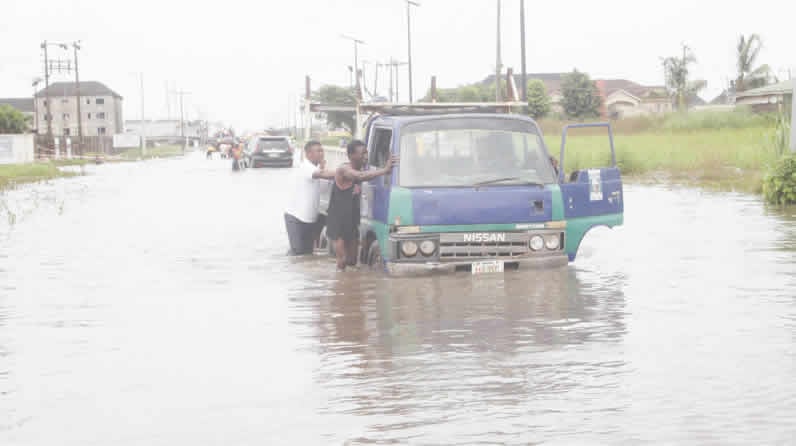The Nigerian Conservation Foundation has noted that with proper management and planning, floodwaters can be transformed into valuable resources for power generation and irrigation.
In an interview, the Director of Technical Programmes at the Nigerian Conservation Foundation, Adedamola Ogunsesan, noted that effective waste management is also critical. As cities grow, so does waste generation.
He said, “We need to institutionalise circular economy practices that convert waste into resources. Encouraging small-scale enterprises that turn waste into wealth, creates jobs, and reduces landfill pressure.
“Interestingly, floodwaters themselves hold potential; they can power turbines or support controlled irrigation if managed properly. But to do this, we must map floodplains accurately and involve communities in flood risk planning. Participatory early-warning systems will help people respond faster and turn what seems like disaster into opportunity.
“Floods and waste are not just urban problems; they’re untapped resources waiting for smart solutions.”
According to him, communities must see environmental protection as an investment in their own future, not a distant government agenda.
He added, “When locals appreciate the ecosystem services around them, like water, soil, and forest, they become co-managers of sustainability. From there, solutions grow from the bottom up, influencing subnational and eventually national policy.
“Urban planning must integrate ecosystem thinking. Each landscape, whether coastal, savannah, or arid, demands tailored strategies. In lowlands, we should protect wetlands while developing around them. In the north, where desertification is advancing, we need green corridors and afforestation. The guiding principle should be resilience and adaptability, ensuring our cities can absorb shocks without collapsing. If we design cities with nature, not against it, we’ll have stronger, more liveable habitats for generations to come.
“Building sustainable cities isn’t the government’s job alone; it’s everyone’s responsibility. Every act of conservation, every properly disposed waste, and every tree planted adds up. If we each play our part, we can create cities that are not just habitable but truly alive. A sustainable city is a shared dream we must all wake up and build together.”
In a similar vein, the National President of the Nigerian Association for Engineering Geology and the Environment, Dr. Waliu Adeolu, called on the government to deploy flooding from dams to generate power in the country.
He said, “Flooding does not just happen, and consistent dredging is essential. Our dams do not only have to be released when there is high rainfall; our dams can be used when we have irrigational activities, so those waters released can be utilised for agricultural purposes and power generation.
“If power generation is deployed, we would hardly have any of these dams having excess water to release when rain falls. Hydroelectric generation means we are not even generating half of the quantity of electricity that we have in the country; that sector can be improved upon, and we can begin to generate 3–4 times what we already generate. What we would be using would be the water coming out from the dam, hence reducing it and keeping the flow at a balanced state. So, it is essential we find a way to utilise the water productively and to our advantage, such that we do not need to release it to flood the environment.”
Expounding on this, an electric/electronics engineer, Fubara Omubo, said harnessing the energy of excess water during flood events and converting it into a source of power revenue for the country involved several innovative methods that could promote both energy generation and flood control.
He said, “One method to consider is harnessing tidal power, which involves capturing the energy generated by the ebb and flow of tides, especially in coastal areas with significant tidal fluctuations. This energy is converted into electricity using tidal turbines and tidal barrages, offering a reliable source of renewable energy.
“Another effective strategy involves run-of-river hydropower projects, which are eco-friendly solutions that use the natural flow of rivers and streams for generating electricity. Unlike conventional dams, these projects have minimal environmental impact and can be strategically situated in flood-prone regions to assist in flood control.”
In August, the National Emergency Management Agency revealed that no fewer than 165 persons have died, 82 missing and 119,791 persons affected by this year’s flooding.
The agency also stated that 138 persons sustained various degrees of injuries, 43,936 were displaced, 8,594 houses were affected and 8,278 farmlands were destroyed across 43 Local Government Areas in 19 States.
It said, “53,314 children, 36,573 women, 24,600 men, 5,304 elderly, and 1,863 disabled persons have so far been affected by this year’s flood.”















